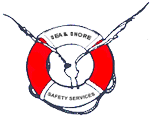What is STCW?
The Standards of Training and Certification of Watchkeepers is a standard of certification approved by the International Maritime Organisation (IMO). It was first implemented in 1978, the current courses are now conducted to the ’95 convention. Training certificates, that carry the STCW ’95 brand and with the approval of any of the IMO White Listed countries (of which Ireland is one), are accepted worldwide provided they have not passed their renewal date. Sea + Shore has the approval of the Irish authorities (among others) to conduct many of the STCW ’95 courses.
When should I service my lifejacket?
The first thing to remember about inflatable lifejackets is that they are high maintenance safety devices. Without regular checks and servicing they may well be worthless in the event of an emergency. At least every three months you should orally inflate your jacket and leave it overnight to ensure that it stays inflated! When repacking check condition of the straps, buckle, whistle and light. Make sure that the Co2 gas bottle is corrosion free and that the seal on the bottle is intact. The operating cartridge/bobbin should indicate green. Aspli lifejackets require a full service every two years others require annual service. You will find out from the stamp on the lung or the paperwork supplied with the jacket how often your jacket should be serviced.
Offshore Survival
The ISAF introduced the Two-day Offshore Survival under Appendix G of the Offshore Special Regulation. This course is now required for 30% of the crew, including skipper, taking part in offshore racing. The full syllabus can be found under courses at the home page. If in any doubt about the necessity of having this course you should confirm with the race organiser. In 2005 Sea + Shore was approved by the ISA, as approval authority in Ireland, to conduct this training.
What is PST?
Personal Survival Technique (PST) training is part of the STCW ’95 group of short courses.
It is a one-day course which involved lectures, video presentations and discussions in the morning session. During the afternoon there is a compulsory pool session. In the pool we practice jumping into the water from a height, getting into and out of a Liferaft and practicing the other survival techniques which were discussed during the morning session. All participants must wear lifejackets during the pool session. There are no pre-requisites for this course but all participants must complete a Self-declaration of fitness. The course is open to non-swimmers.
It is a one-day course which involved lectures, video presentations and discussions in the morning session. During the afternoon there is a compulsory pool session. In the pool we practice jumping into the water from a height, getting into and out of a Liferaft and practicing the other survival techniques which were discussed during the morning session. All participants must wear lifejackets during the pool session. There are no pre-requisites for this course but all participants must complete a Self-declaration of fitness. The course is open to non-swimmers.

